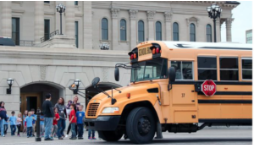By JOHN HANNA
TOPEKA, Kan. (AP) — Kansas lawmakers have blown several informal deadlines for boosting funding for public schools to satisfy a court mandate because Republicans who control the Legislature are at odds over how to allocate the new dollars and what policy strings should be attached.
The state’s attorneys must file a written report with the Kansas Supreme Court by April 15, telling the justices how legislators responded to the high court’s ruling last yearthat spending on public schools is insufficient. The Legislature is set to start its annual spring break April 6 and not return to the Statehouse until May 1.
Democratic Gov. Laura Kelly urged legislators to pass her plan for an education funding increase of roughly $90 million a year by the end of February. Attorney General Derek Schmidt, a Republican, told lawmakers they should finish their work by March 15.
The Senate approved Kelly’s plan March 14. Top House Republicans back a plan to target new dollars to programs for at-risk students but wouldn’t bring it up for a debate this week because it did not have enough votes to pass. The House and Senate plan to begin negotiations next week on the final version of a school funding bill anyway — without a clear sense of their path forward.
“We’ve got to have an answer to the court by the time we go home next week,” Senate Vice President Jeff Longbine, a moderate Emporia Republican, said Wednesday. “Time is of the essence.”
Four local school districts sued the state over education funding in 2010, and the Supreme Court has issued six rulings directing legislators to increase education funding, now more than $4 billion a year. The high court said a 2018 law promising to phase in a $548 million increase by the 2022-23 school year wasn’t sufficient because it did not account for inflation in recent years.
Educators have argued that legislators should just increase the state’s total aid to its 286 school districts, and Kelly’s plan does that.
Top Republicans in the House have argued that new funds should target helping struggling students, including children with behavioral and mental health problems. Their proposal actually would spend $14 million more than Kelly proposes during the budget year that begins in July — but it includes grants for school safety upgrades and other specific programs.
“Why wouldn’t we target it?” said House Majority Leader Dan Hawkins, a conservative Wichita Republican. “What’s the purpose of doing this? It’s to move the needle. It’s to make education better.”
Many Republicans, particularly conservatives, also want to tie the money to education policy changes. The strategy worked well for them in 2014, when they successfully repealed a state law guaranteeing tenure to teachers who’d been in the classroom at least three years.
House conservatives initially pushed an education bill that included a proposal to give parents of children in public schools state-funded scholarships so that their children could move to other schools, including private ones. But they backed off that proposal and others, and the House passed a narrower policy bill this week on a 63-61 vote.
Democrats and many moderate Republicans contend that a straightforward funding bill is the best approach and that lawmakers ought to leave decisions about how new dollars are spent to local school boards.
“I think the best way to do it is to stick with what I proposed initially and what the Senate passed, with a clean, simple deal-with-inflation factor and move on,” Kelly told reporters Wednesday.
